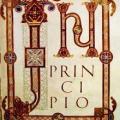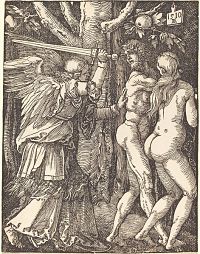198. Grace Notes: Eriugena and the Predestination Controversy
John Scotus Eriugena debates free will with his rival Gottschalk, arguing that God predestines the saved but not the damned.
Themes:
• John Scottus Eriugena, Treatise on Divine Predestination, trans. M. Brennan (Notre Dame: 1998).
• V. Genke and F.X. Gumerlock (trans.), Gottschalk and a Medieval Predestination Controversy (Milwaukee: 2010).
• P. Adamson, “Freedom and Determinism,” in R. Pasnau (ed.), The Cambridge History of Medieval Philosophy, 2 vols (Cambridge: 2010), vol. 1, 399-413.
• D. Carabine, John Scottus Eriugena (Oxford: 2000).
• D. Ganz, “The Debate on Predestination,” in M.T. Gibson and J.L. Nelson (eds), Charles the Bald: Court and Kingdom (Aldershot: 1990), 283-302.
• D. O’Meara, “The Problem of Speaking about God in John Scottus Eriugena,” in U.-R. Blumenthal (ed.), Carolingian Essays (Washington DC: 1983), 151-67.
• J.J. O’Meara, Eriugena (Oxford: 1988).
• J. Marenbon, “John Scottus and Carolingian Theology: from the De praedestinatione, its Background and its Critics, to the Periphyseon,” in M.T. Gibson and J.L. Nelson (eds), Charles the Bald: Court and Kingdom (Aldershot: 1990), 303-25.







Comments
Eriugena Poem
Thanks Peter for the excellent introduction to the work of Eriugena. My interest in him was first piqued by reading a short poem by Sorley MacLean, one of the foremost modern Scots Gaelic poets, entitled "Scotus Erigena". This episode helps a lot to put this poem in context and it can be found in the volume of collected works of Sorley MacLean called "Caoir Gheal Leumraich (White Leaping Flame)" on page 54 in English and page 55 in Gaelic. I'm looking forward to the next episode on the Periphyseon.
In reply to Eriugena Poem by Drew McNaughton
Poems
Thanks! I think in that case you will also enjoy the start of episode 202, which is going to feature an Old Irish poem...
Eriugena
Eriugena : "John of Ireland" or John the Scot (Irish) man. In his era, Ireland was known by the name Scotland, hence Scotus.
He had complete access to Greek and Latin literature, because the Christian monks who came to Ireland after Patrick, brought the Greek and Latin works with them. The Greek classcis in particular have been a great influence on Irish myth. See Robin Flower's "The Irish Tradition" Oxford University Press: 1st edition 1947, reprinted 1948, 1963, 1966, 1970, 1973.
What many scholars overlook, is that Patrick never told the Irish that their Pagan religion was erronoeus: he merely "married" Christan and Pagan religious practices.
This was actually underlined by the British in 1795, when with Catholic Emanciaption, they set up the Roman Catholc Theological College at Maynooth. Telling the Irish church leaders "This is the continuity of the Irish Church, as here is where Nuadh had his "seminary" for Druids in pre-Christian days". Maynooth translates as The Plain of Nuadh. May = plain: Nooth = Nuadh.
With the creation of the Irish Free State in 1921, the RC hierarchy obtained total control of education, returning the 26 counties of that State, not alone "to the Dark Ages" but to Pagan times where the Druid was a magician. When Patrick "drove the snakes out of Ireland" (there never were any snakes in Ireland - apart from politicans), it was the symbol of the Druids he destroyed; the Chief Druid had a staff with a snakes head on it.
With the arrival of the Dark Ages; the Irish monks re-evangelised Europe: the greatest library of "Irish Literature" is in Bobbio.
Thnak you for this important talk.
Single predestination
Hm. Eriugena's solution to the problem here seems pretty unconvincing to me. It makes me think of a parent who has one cookie and chooses to give it to one of her 2 children. When the other asks why she chose not to give him the cookie, she replies that she didn't; she only chose to give it to his brother, and never chose to withhold it from him. This is a nonsensical answer since these 2 choices amount to the exact same thing. It seems to me that God is in the same situation when he predestines the salvation of the elect. Since damnation is the inevitable result of not being saved, any such predestination of salvation is also simultaneously a predestination of damnation for everybody else.
Maybe the idea is that you can only choose or "predestine" your future actions, and not future inaction? So to speak properly I shouldn't say that I chose not to do my homework last night; I should only say that I chose to sit on my butt and watch TV. Since the damnation of the non-elect occurs due to God's inaction, he technically doesn't "predestine" their damnation, even though he knows it's going to happen and could act to prevent it; whereas in the case of the elect, he is planning to take action to save them and thus "predestines" their salvation. This would still seem to be letting God off on a technicality though.
In reply to Single predestination by Kenneth Connally
Predestination
Well, I share your skepticism about his solution. But to speak up in his favor for the sake of argument, he could reply that your cookie example is not analogous because there the two children are entirely passive in your story, they aren't making a choice. A better analogy would be to children who may themselves choose to do wrong, so that mere "non-interference" means letting the child earn whatever punishment he has coming to him for the wrongdoing. (Compare this to my analogy to the drowning people who are actively trying to drown themselves, not merely innocently finding themselves in water and unable to swim.) Does that help?
In reply to Predestination by Peter Adamson
Thanks for the reply Peter!
Thanks for the reply Peter! Well, what if we just add agency for the children into my original analogy: the one child asks for the cookie and the other doesn't, so she gives it to the one who asks and not to the other. Isn't it still clear that her choice to give the cookie only to the one who asked for it implies not giving it to the other? It makes sense to me to excuse her not giving the other kid a cookie by saying "He never asked for it," but not by saying "she didn't choose to withhold it, only to give it to the other."
In reply to Thanks for the reply Peter! by Kenneth Connally
Agency
That helps some, but bear in mind that the humans confronting God are not just asking for help, they are freely sinning. So to make the child case more analogous we have to suppose that both are freely misbehaving, and that the adult decides to help one stop misbehaving while punishing the other. This may seem unfair and arbitrary (which is why I tend to agree with your original complaint) but it at least captures the point that actually both kids would deserve to be punished, like all of humankind, so anyone who gets "saved" is a bonus beyond what God is actually required to do by justice.
I know this isn't a big …
I know this isn't a big "gotcha" but having grown up with Christian theology, sometimes the obvious is only in retrospect.
The free will defense on its own is pretty silly. The world in its current state may be the result of free will, but also creates an environment where exercising one's free will isn't possible for everyone or evenly available. Putting aside the issue of mortality where people can be killed very young or otherwise be killed to prevent them from exercising a free-will choice... A perfect, all-powerful god would be able to create the world under conditions where free will is available to everyone equally. Because of this, presupposing the existence of a monotheistic god, we can only conclude that god doesn't want free will to be available to everyone equally. Which, if he's giving the mandate of heaven to random monarchs who kill, enslave, and poorly manage resources, is already a given.
Before listening to the predestination bits - It might sound weird for me to pivot, but (again as a kid), predestination makes some intuitive sense to me. Again likening God to an author, he creates people with their inborn traits. But no one would say that the villain of a book doesn't deserve to be punished at the end because he was written to be evil. Within the context of the book, his choices were freely his own.
But yes, the mere concept of creating creatures explicitly for the sake of feeling pain and being tortured is cruel. I'm sure the argument is going to be that, due to free will, the choice was "create humans (some to be saved and some to be sent to hell) or don't create humans (and life will never exist)," and that the suffering of some evil people does not outweigh the needs of the whole world. And God, as we all know, can't stand the idea of not punishing sinners or allowing sinners to live forever with him. But you know, God being God, God could have made a million gardens of Eden on a million planet, let everyone live forever without having offspring, and put anyone evil in time-out in the Garden of Not Quite As Good As Eden. OK, let's see if that's where this goes.
Oh boy, foreknowledge not equalling predestination is true... as long as the person with foreknowledge isn't the all powerful creator.
14:33 Yeah, God can only create one thing, not a duality! That's why the Bible doesn't say anything like "In the beginning, God created the heavens and the earth"- oh wait.
Not to have a bad faith interpretation - I get what he's saying, like how God is quoting as creating light to separate from the darkness and then named them both. God in this view has created forgiveness/mercy and separated it from d*mnation (I don't know if you have swear filters lol), which was the default state of man with free choice. But it does seem to be to be quibbling about the words chosen when they both mean the same thing - that God did in fact know ahead of time who is going to be saved and who isn't, created the world with this knowledge, and has already made any changes he wants, meaning that predestination is happening no matter the reasoning why.
And on top of that, the argument is implying that God doesn't have any control over the state of d*mnation. If we're backing it up with the "separate light from darkness," then we're taking that verse literally and also positing that darkness preceded creation and (unless we assume there's a deleted section about creating darkness for some reason) preceded God's existence too, which would make this whole argument topple like a house of cards.
I do like the mention of God being outside of time, which is definitely a requirement for this kind of thing.
The Christianity I grew up with requires a lot of blame and guilt to function. Around 17:05 re: the Pelagian heresy giving humans free will and also the ability to merit salvation on their own. The framework I knew was that it was hypothetically and physically possible for this to happen, and in fact that is how Jesus lived each day despite being 100% human. But the fall of Eden corrupted us, so even though it is hypothetically possible, much like communism (according to what I learned lol, just to emphasize the weird bias), it can never be implemented practically. This is because of our own individual failings as sinful creatures, where we can't even go a few minutes without sinning. The definition of sin is usually stretched to make this make sense, eg if you think you're sinless? That's pride and blasphemy, baby. But you need to have that notion that perfection is possible because otherwise you don't feel individually responsible for failing to meet it.
Add new comment